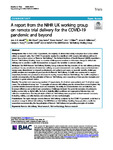A report from the NIHR UK working group on remote trial delivery for the COVID-19 pandemic and beyond
| dc.contributor.author | Masoli, JAH | |
| dc.contributor.author | Down, K | |
| dc.contributor.author | Nestor, G | |
| dc.contributor.author | Hudson, S | |
| dc.contributor.author | O’Brien, JT | |
| dc.contributor.author | Williamson, JD | |
| dc.contributor.author | Young, CA | |
| dc.contributor.author | Carroll, Camille | |
| dc.date.accessioned | 2022-01-13T14:02:06Z | |
| dc.date.issued | 2021-12-11 | |
| dc.identifier.issn | 1745-6215 | |
| dc.identifier.issn | 1745-6215 | |
| dc.identifier.other | 911 | |
| dc.identifier.uri | http://hdl.handle.net/10026.1/18552 | |
| dc.description.abstract |
<jats:title>Abstract</jats:title><jats:sec> <jats:title>Background</jats:title> <jats:p>Prior to the COVID-19 pandemic, the majority of clinical trial activity took place face to face within clinical or research units. The COVID-19 pandemic resulted in a significant shift towards trial delivery without in-person face-to-face contact or “Remote Trial Delivery”. The National Institute of Health Research (NIHR) assembled a Remote Trial Delivery Working Group to consider challenges and enablers to this major change in clinical trial delivery and to provide a toolkit for researchers to support the transition to remote delivery.</jats:p> </jats:sec><jats:sec> <jats:title>Methods</jats:title> <jats:p>The NIHR Remote Trial Delivery Working Group evaluated five key domains of the trial delivery pathway: participant factors, recruitment, intervention delivery, outcome measurement and quality assurance. Independent surveys were disseminated to research professionals, and patients and carers, to ascertain benefits, challenges, pitfalls, enablers and examples of good practice in Remote Trial Delivery. A toolkit was constructed to support researchers, funders and governance structures in moving towards Remote Trial Delivery. The toolkit comprises a website encompassing the key principles of Remote Trial Delivery, and a repository of best practice examples and questions to guide research teams.</jats:p> </jats:sec><jats:sec> <jats:title>Results</jats:title> <jats:p>The patient and carer survey received 47 respondents, 34 of whom were patients and 13 of whom were carers. The professional survey had 115 examples of remote trial delivery practice entered from across England. Key potential benefits included broader reach and inclusivity, the ability for standardisation and centralisation, and increased efficiency and patient/carer convenience. Challenges included the potential exclusion of participants lacking connectivity or digital skills, the lack of digitally skilled workforce and appropriate infrastructure, and validation requirements. Five key principles of Remote Trial Delivery were proposed: national research standards, inclusivity, validity, cost-effectiveness and evaluation of new methodologies.</jats:p> </jats:sec><jats:sec> <jats:title>Conclusions</jats:title> <jats:p>The rapid changes towards Remote Trial Delivery catalysed by the COVID-19 pandemic could lead to sustained change in clinical trial delivery. The NIHR Remote Trial Delivery Working Group provide a toolkit for researchers recommending five key principles of Remote Trial Delivery and providing examples of enablers.</jats:p> </jats:sec> | |
| dc.format.extent | 911- | |
| dc.format.medium | Electronic | |
| dc.language | en | |
| dc.language.iso | en | |
| dc.publisher | BMC | |
| dc.subject | Remote trial delivery | |
| dc.subject | Virtual research | |
| dc.subject | Trial methodology | |
| dc.subject | Remote research | |
| dc.title | A report from the NIHR UK working group on remote trial delivery for the COVID-19 pandemic and beyond | |
| dc.type | journal-article | |
| dc.type | Letter | |
| plymouth.author-url | https://www.webofscience.com/api/gateway?GWVersion=2&SrcApp=PARTNER_APP&SrcAuth=LinksAMR&KeyUT=WOS:000729233100009&DestLinkType=FullRecord&DestApp=ALL_WOS&UsrCustomerID=11bb513d99f797142bcfeffcc58ea008 | |
| plymouth.issue | 1 | |
| plymouth.volume | 22 | |
| plymouth.publication-status | Published | |
| plymouth.journal | Trials | |
| dc.identifier.doi | 10.1186/s13063-021-05880-8 | |
| plymouth.organisational-group | /Plymouth | |
| plymouth.organisational-group | /Plymouth/Faculty of Health | |
| plymouth.organisational-group | /Plymouth/Faculty of Health/Peninsula Medical School | |
| plymouth.organisational-group | /Plymouth/REF 2021 Researchers by UoA | |
| plymouth.organisational-group | /Plymouth/REF 2021 Researchers by UoA/UoA03 Allied Health Professions, Dentistry, Nursing and Pharmacy | |
| plymouth.organisational-group | /Plymouth/Research Groups | |
| plymouth.organisational-group | /Plymouth/Research Groups/FoH - Applied Parkinson's Research | |
| plymouth.organisational-group | /Plymouth/Research Groups/FoH - Community and Primary Care | |
| plymouth.organisational-group | /Plymouth/Research Groups/Institute of Translational and Stratified Medicine (ITSMED) | |
| plymouth.organisational-group | /Plymouth/Research Groups/Institute of Translational and Stratified Medicine (ITSMED)/CCT&PS | |
| plymouth.organisational-group | /Plymouth/Research Groups/Plymouth Institute of Health and Care Research (PIHR) | |
| plymouth.organisational-group | /Plymouth/Users by role | |
| plymouth.organisational-group | /Plymouth/Users by role/Academics | |
| dc.publisher.place | England | |
| dcterms.dateAccepted | 2021-11-24 | |
| dc.rights.embargodate | 2022-1-14 | |
| dc.identifier.eissn | 1745-6215 | |
| dc.rights.embargoperiod | Not known | |
| rioxxterms.versionofrecord | 10.1186/s13063-021-05880-8 | |
| rioxxterms.licenseref.uri | http://www.rioxx.net/licenses/all-rights-reserved | |
| rioxxterms.licenseref.startdate | 2021-12-11 | |
| rioxxterms.type | Journal Article/Review |


